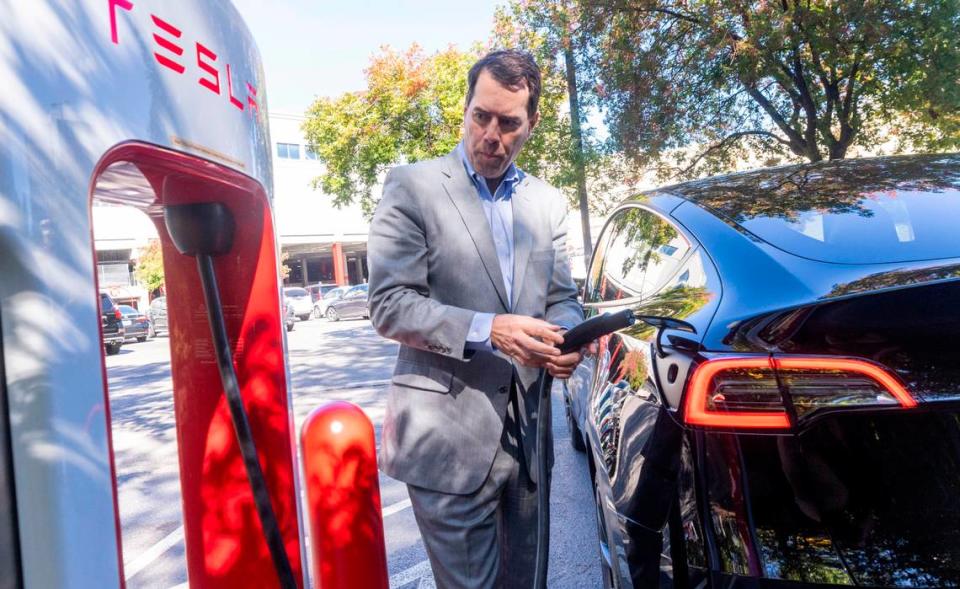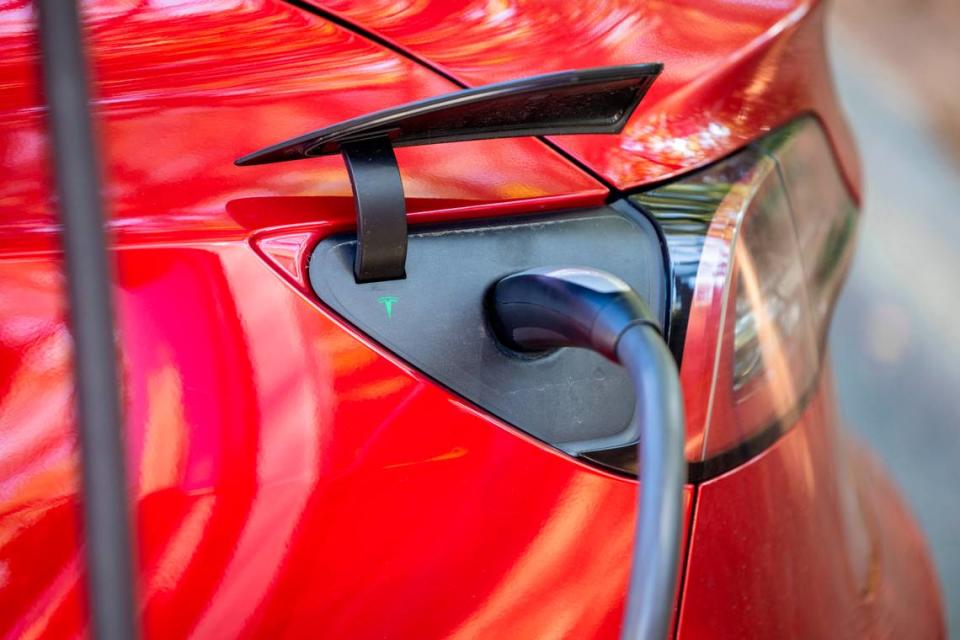EV fees, rideshare taxes, DMV charges: NC lawmakers find new revenue for roads
People who own electric vehicles will soon face new and higher registration fees. People who take Uber, Lyft or a taxi will pay a new tax starting in 2025. And anyone who uses a debit or credit card at the DMV will pay a new fee as of next summer.
The state budget, approved by the General Assembly last month and allowed to become law by Gov. Roy Cooper, includes these and other changes in how North Carolina raises money for transportation.
It’s part of an effort to reduce the state’s reliance on the gas tax, which is becoming less dependable as cars become more fuel efficient or, in the case of EVs, don’t use gas at all.
The effort began last year when the General Assembly voted to divert state sales tax revenue to transportation for the first time. By next year, 6% of sales taxes will go to the State Highway Fund, producing more than $600 million a year primarily for roads and bridges.
Here’s what the General Assembly did this year:
▪ Increased the annual registration fee for fully electric vehicles from $140.25 to $180 on Jan. 1. The fee will be adjusted for inflation every four years, starting next July 1, when it’s expected to go to $214.38 a year, according to the legislature’s Fiscal Research Division.
▪ Enacted a new registration fee of $90 a year for plug-in hybrid vehicles, which use both electricity and gas. That fee will begin Jan. 1 and also be adjusted for inflation next summer, to an estimated $107.
Both fees come on top of the $38.75 that all passenger vehicles pay the DMV each year. The special fees are expected to generate about $4 million in the fiscal year that starts next July.
▪ Enacted a new “transportation commerce tax” on taxis and rideshare companies such as Uber and Lyft. Starting July 1, 2025, passengers will pay an extra 2% of their fare for an exclusive ride and 1% for a shared ride, generating about $11.5 million for the Highway Fund in the first full year.
▪ Allowed DMV to charge transaction fees on electronic payments starting next July 1. The fees, which can’t exceed 2% of a transaction, will cover the charges the agency incurs from banks and card companies and will generate about $30.7 million in the first full year.
The changes originated with the NC Ten Commission, a group of business and interest groups convened by Sen. Vickie Sawyer, a Republican who co-chairs the appropriations committee for transportation. Sawyer, who lives in Mooresville just north of Charlotte, says more changes are likely to come as the state looks to diversify its revenue for transportation.

“There are a lot of different options that we can still continue to explore,” she said in an interview. “There’s no right or wrong. It’s just what we can get a consensus on.”
Sawyer said both Lyft and Uber were involved with the NC Ten Commission and helped craft the new rideshare tax. The original idea was a flat 25 or 50 cents per ride, but the companies said a percentage tax was easier to collect, she said.
Uber appreciated being involved and doesn’t object to the new tax, said spokesman Javi Correoso.
“We support this plan that keeps rideshare access affordable and reliable for North Carolina residents,” Correoso wrote in an email.
Electric vehicle fees draw opposition
Electric vehicle fees remain more contentious.
EVs are an emerging strategy to reduce air pollution and the effects of climate change, which is why the federal government is encouraging their production and purchase, says Megan Kimball, an attorney for the Southern Environmental Law Center.
“We should be doing everything we can to increase the number of EVs on the road,” Kimball said in an interview. “Adding higher and new fees is not the way to achieve that.”
Kimball also noted that EVs are not a significant threat to gas tax revenue, at least not yet. Of the 8.7 million registered vehicles in North Carolina in August, only 74,355 were fully electric or plug-in hybrids, or less than 1%, according to the DMV.
“There will come a time when we have such a large percentage of electric vehicles on the road that we will need to reconsider how we raise revenue for transportation,” Kimball said. “But we’re nowhere close to that yet.”
Fairness is another issue cited by EV owners such as Carmalee Scarpitti of Willow Spring.
The special registration fees are supposed to roughly match what the average gas-powered vehicle pays in fuel taxes. But Scarpitti, who has driven a Nissan Leaf since 2011, says a flat fee doesn’t account for how much a driver uses the road, the way a gas tax does.

“I’m not opposed to paying my fair share. But I think I should pay my fair share, not some arbitrary amount that doesn’t take into consideration how many miles I’ve put on my vehicle,” she said. “You’re taxing my electric vehicle like every single person that drives an EV drives the same number of miles every year, and that’s not right at all.”
Sawyer agrees. Even though she introduced the EV fee increase in the General Assembly, she sees them as a temporary bridge to a time when the state replaces them with a consumption tax for electricity. She noted that on Jan. 1 Oklahoma will begin charging 3 cents per kilowatt hour at public charging stations that collect money.
Such a tax would mirror the essential fairness of the gas tax, Sawyer said.
“So grandma, who only goes to the grocery store and doctor, only pays a little bit in gas tax,” she said. “But me who is up and down burning the roads to campaign events in Raleigh pays a lot more. That’s the way it should be for EV owners.”
Gas tax revenue still climbing for now
Gas tax revenue is expected to continue to inch up over the next couple of fiscal years, according to forecasts baked into the state budget, to $2.4 billion in the second year. The state fuel tax, now 40.5 cents a gallon, accounts for about half of state revenues for transportation (the state also receives funding derived from federal fuel taxes of 18.3 cents on gas and 23.4 cents on diesel).
The climbing revenue is due largely to the state’s growing population, Sawyer says. Some states, including Virginia, have already seen their fuel tax revenue peak and start to decline, largely because of more fuel efficient vehicles.
States and transportation organizations have been looking at alternatives to the gas tax for years. In 2019, the N.C. Department of Transportation created the N.C. FIRST Commission of business people, politicians, economists and others whose final report included several potential strategies, some taken up by Sawyer’s commission.

The N.C. Chamber, a statewide business group, published its own reports on possible new sources of transportation revenue in 2015 and 2020. The chamber supports replacing fuel taxes with an “access user fee,” in which registered vehicle owners would pay a monthly or annual fee to use the state’s roads, the way people pay for access to a mobile phone network.
Sawyer says other ideas that won support from the Ten Commission include charging fees to Amazon, UPS and other companies whose delivery trucks use the roads and allowing local or regional governments to use tolls to finance roads and bridges.
Politics will continue to play a role in determining what kinds of revenue the state taps. As it voted in favor of EV fees and taxi and rideshare taxes, the General Assembly chose to extend a moratorium on collecting sales tax on aviation fuel used at commercial airports.
Suspending the tax, which would have generated about $20 million a year, is incentive to encourage airlines to do business in the state, Sawyer said, particularly American Airlines, which has a large hub in Charlotte.

